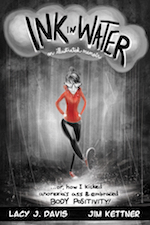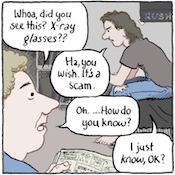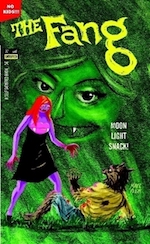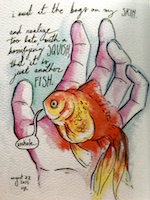What we saw (and loved) at Short Run
This report was written by Paul Constant, Martin McClellan, and Dawn McCarra Bass.
Last year’s Short Run Comix & Arts Festival was the weekend before the presidential election, and most people we talked to about it can only recall the convention as a blur preceding one of the worst weeks in recent memory. Perhaps for that reason, people seemed extra-ready to have a doubly good time at this year’s Short Run. Unlike the averted eyes and tense political conversations of last year, everyone we spoke with on Saturday seemed happy and ready to have fun.
One of the best parts of any Short Run is witnessing the supportiveness of the comics community in action. We found a bunch of books through the recommendations of Seattle comics stalwarts. Fantagraphics PR guru Jacq Cohen directed us to Perfect Discipline and Unbending Loyalty, a gorgeous comic from Tommi Parrish published by Perfectly Acceptable Press, a risograph publisher out of Chicago.

We also checked out work by Rebecca Artemisa, the recipient of the 2017 Dash Grant — a booster grant from Short Run. Weepy is a tribute to La Llorona ("the crying woman"), the anti-heroine of a ghost story about a mother who drowns her children and herself in rage at a husband's infidelity, then haunts the river in grief. The tiny book, a retablo as story, is boisterous with color and movement. Panels flourish in all shapes and sizes, bordered with flowers and leaves, birds and snakes, stitches and braids (Artemisa joked that it was her first "real" comic — you know, with boxes). Both playful and serious, the tone is dead-on for transforming a story about shame and fear into something much bigger.
We stopped by the booth for local minicomics store and art gallery Push/Pull only to find a new anthology titled Push/Pull: Collective Conscience featuring past and present members of the gallery. Push/Pull cofounder Maxx Follis-Goodkind told us it was the first product of a new press bearing the Push/Pull imprint. We can’t wait to see what’s next from the Ballard gallery/shop/school/publisher/collective.
On a whim of presidential curiosity, we picked up That Time I Met Bill Clinton…and He Stole My Favorite Pen! and Cats of the White House: Ten True Tales of Presidential Pets from Portland cartoonist Rachel Scheer, who works under the pseudonym Rachel Comics. Bill Clinton is an autobiographical account of a visit to the White House during the first Take Your Daughter to Work Day, and Cats seems to be a spiritual sequel to that book’s fascination with Socks, the Clintons’ cat. Rachel’s simple illustrations and trivia-nerd enthusiasm for the theme adds some humanity to the idea of presidents. The thought of Abraham Lincoln seeking comfort from his cats in the darkest hours of the Civil War is heartbreaking and tender and well worth the price of admission.

Laura Graves obviously has so much fun making her comics. They’re all set in a demonic other-world, but the short Butts2Butts (which, like a single, is b/w another story Chopping Block) is a hilarious and weird story of a couple freezing together in bed, who awaken a demonic portal when they decide to sleep butt to butt. We also picked up her Witches Get Stitches, and an issue of 666 Bistro, which we thoroughly enjoyed.
We used this year’s Short Run as an excuse to catch up on some of the cartoonists who were instrumental in the Intruder comics newspaper. Most of them had new stuff to show off at this year’s festival.

Palm also brought a newspaper-style zine documenting that time he broke his drawing arm and taught himself to draw with his non-dominant left hand. With plenty of photos of the pins in Palm’s arm, as well as a ton of sketches documenting his progress, artists will likely find How to Become Ambidextrous In One Easy Fall to be an inspirational document.
Heads Will Casserole, a new comic drawn by Marie Hausauer and written by Ben Horak, begins with a couple meet-cute-ing at a butcher shop. It’s a scene that wouldn’t be out of place in a romantic comedy, even with the lingering shots of bloody beef being hacked to pieces. But then the book descends into a monster-movie farce, with the couple’s romantic dissolution taking the form of a giant monster eating the guests at their dinner party.
Tom Van Deusen’s The Big Me Book is an autobiographical comic about a fictionalized version of Van Deusen (or at least, with its Nazi jokes and its wild egomania and misogyny on display, one hopes it’s a fictionalized version). Nobody makes fun of unselfconscious self-aggrandizement quite like Van Deusen, and this comic — which includes a magical cat and a very funny visual gag about thought balloons — demonstrates a whole new level of cartooning ability.
It wouldn’t be a Short Run without picking up the latest Bug Boys comic from Laura Knetzger. This new one, issue 15, finds Stag-B and Rhino-B on a trip to a bug literary convention in the big city with their friend Dome Spider, the grand librarian. The poor beetles are overwhelmed by the big city. As always, it’s the small observations that make this charming comic so fascinating — details like the boys encountering alcohol in the restaurant, and being told their small town had banned it. Or finding out the metropolis is, in fact, in a human garbage dump. Dome Spider loves being in the city, and the overwhelming wide-eyed bug boys get to see the scary world through her appreciative eyes, and process their feelings about it. We wish Bug Boys were taught in every classroom, but like the best of all things that are either made — or appropriate — for kids, reading as an adult layers in a whole new kind of depth to their experiences.
Lawrence Lindell gave us the option of a number of covers for his xerox’d zine-comic Couldn’t Afford Therapy So I Made This. He hand-drew each cover, so each was unique. The comic explores his inner voice in processing mental health issues, and how being black layers a different meaning over mental illness. Lindell is acutely focused on presenting positive attitudes and uplifting messages to black audiences used to confronting negative associations in our media, while looking straight into the kinds of questions and inner arguments that come from dealing with difficult times. He’s expanding this piece into a full book, and we think his mission is a great one worth supporting.
We bought two pieces from Daria Tessler, Three Magical Recipes From the Book of Secrets of Albertus Magnus, and Living Sculptures for Home and Office. These gorgeous risograph comics (from the aforementioned Perfectly Acceptable press) are incredibly tactile — the printing colors are bright and the ink lays on the nice paper stock in thick slabs. The front of Living Sculptures also has a foil stamp — it’s fair to describe these as super-graphic, every page akin to a luxurious poster. The stories evoke ornate mysticism, and are so much fun to read that we found myself putting them down, then picking them up again immediately to spend more time with.
We love an existential crisis, and several artists this year represented the dark void of the human soul exceptionally well.

Flipping through Jessica Hoffman's you are here is dizzying. Printed with images from Google maps and found surveillance footage, the slender booklet feels vast, using color washes and cutouts to create a sense of rapid movement between sky and earth. Hoffman (who co-manages Paper Press Punch) has an ongoing concern with electronic surveillance and what it shows and hides. you are here demonstrates how a digital map can show incredible detail about where you are and still leave you very, very lost.
It's not impossible to get Cole Johnson's attention, but it's not exactly easy, either. When we first passed his booth, he was heads-down inking on what looked like old-school lined notepaper. That hand-drawn style, almost childish, is the right fit for his mopey-in-the-best-way storytelling, where life is all dirty blues and greens, and success — financial, romantic, social — is always just out of reach. Keep an eye on it, though: the way scenery and characters move within the delicate panel boundaries is extremely sophisticated. A lot of craft went into these delightfully downtrodden pages.
Jessie and Jaya Nicely put out a luxuriously beautiful culinary/culture magazine called Compound Butter, and we picked up issue #4, which centered art, articles, recipes, and interviews around the idea of the word "Rotten." Jessie is editor-in-chief, and Jaya is art director, and it is clear the amount of time they put into making each issue. The closest analogy would be a less frivolously quirky Lucky Peach combined with Slow Food, but with an eye towards inclusion and diversity of culture, and thought. We had a nice chat with them about where to eat around Seattle (they, unsurprisingly, already had some good places picked out), and after spending some time with this issue, I’m definitely going to want to discover some others.
Amy Burek, founder and sole member of the Awkward Ladies Club, has a sharp eye for the Internet's ability to tell us awkward truths about ourselves. It was almost impossible to choose just one from titles like Dad Tweets: Collected Tweets from 2009 to 2013 and Never Dates Dudes From the Internet: Responses to a Craigslist F4M Ad. We finally settled on her newest, Is This Normal? The Search for Pregnancy and Parenting Advice on the Internet, which reprints questions posted to the interverse with intense anxiety and hope by expecting and new mothers. No question could be more quintessentially human, no human condition more fraught with concerns both trivial and mortal, and Burek's careful selection is hilarious and poignant.
Michael Sabine Rear writes with piercing accuracy about disability. She's read at the Comics and Medicine Conference, and her Bending Spoons: A Field Guide to Ableist Microaggressions provides a valuable self-check for the well- (and not-so-well-)intentioned alike. Her latest is Reverse Flâneur, a minicomic memoir about traveling in Austria. The multiple layers of inversion here are irresistible: a blind illustratrix drawing what it's like to be viewed as disabled — what it's like to be viewed, as a disabled person whose disability is one of vision — what it's like to be viewed, as a visually disabled person who is obsessed with dressing in style and oh, by the way, a hyperintelligent art theory geek. If that makes your brain hurt, trust us, it's in a good way.
You can’t have a big one-day festival of comics without a little tiny bit of regret, so here are some of ours: One of us wishes they'd actually gotten up the courage to tell Julia Wertz to her face how much we love her comics. SRoB co-founder Paul Constant wishes he’d done a better job of handling the panel conversation with comics geniuses Emil Ferris and Leela Corman. A tighter moderating grip would’ve pulled the two cartoonists into a conversation for the ages. Instead, he left them adrift, though Ferris’s references to time travel and to the idea of our spirits living onward in artificial bodies designed to look like old movie monsters were definitely worth our time. We didn’t pick up anything new from Coin-Op comics, the brother-sister act that blew our minds a couple Short Runs ago. We didn’t give short story writer Stacey Levine a tweet to turn into a short-short story. We didn’t get to say hi to all the amazing people we wanted to say hi to. And we didn’t participate in nearly as many of the Short Run satellite events that we’d hoped to.
But regret is an organic part of all this. Short Run is, by design, too big for any one person — or group of three people — to experience in its entirety. And in fact this Short Run was bigger than it’s ever been. Hopefully next year’s Short Run will be bigger still. (We heard a lot of folks talk about how they wished Short Run would become a two-day festival to give people more time and opportunity to experience everything. We endorse that sentiment.)
It’s a real testament to Short Run founders Kelly Froh and Eroyn Franklin that so many people want to take part in this thing they’ve created. This festival, which started as a tiny little get-together in the Vera Project less than a decade ago, has doubled and tripled in size while staying independent and inclusive and ferociously creative. It draws artists from up and down the West Coast — and beyond — and is a new home for the independent publishers that lost a showcase when the APRIL Festival announced its closing this year.
In virtually no time flat, Short Run has gone from “let’s put on a show” to “this is the heart and soul of Seattle’s creative community.” Imagining a Seattle without a Short Run is as unthinkable as a Seattle skyline without a Space Needle.